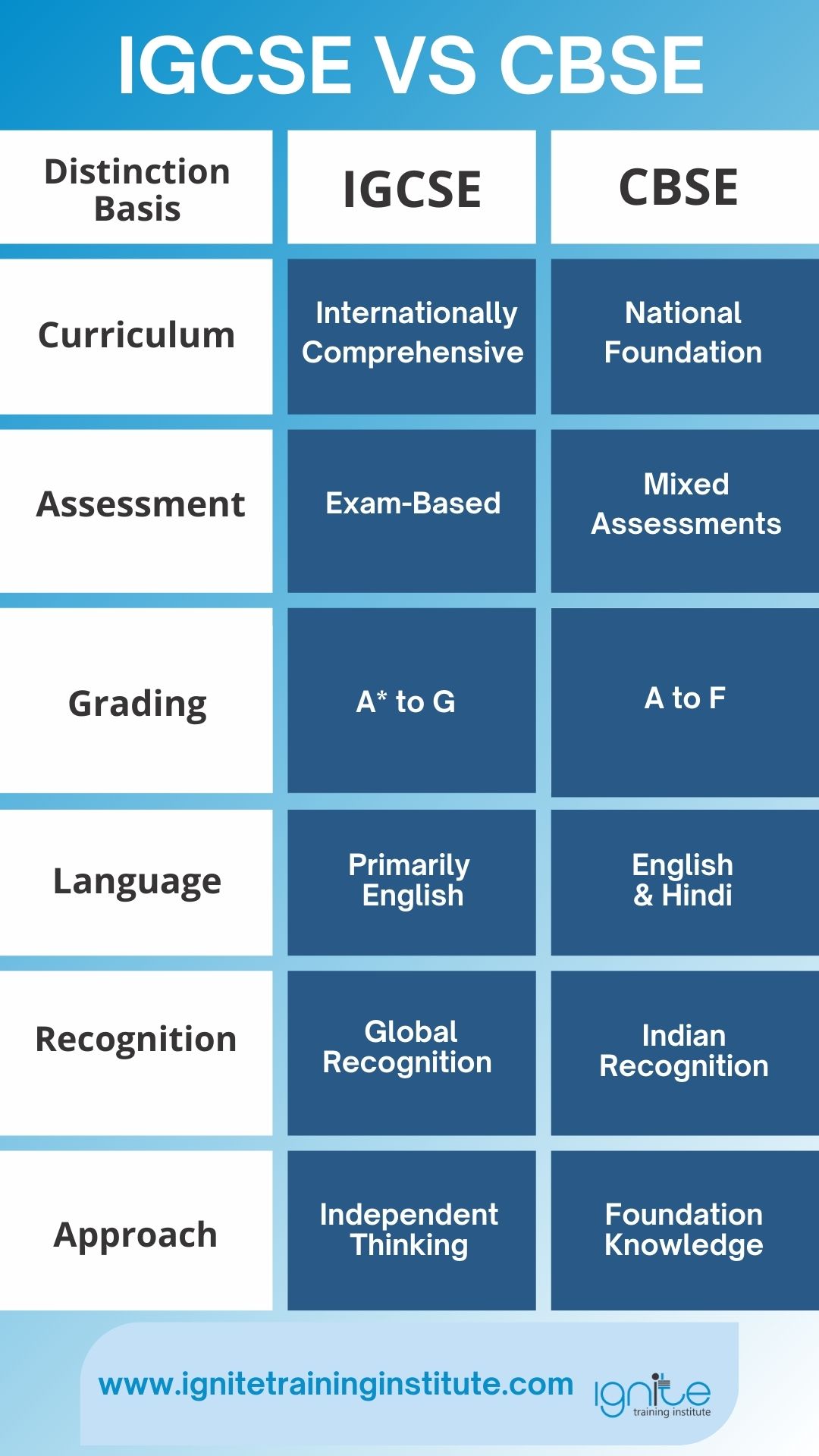Are you a student or parent looking to enroll in a new school and struggling to decide between IGCSE and CBSE? The decision to choose between IGCSE and CBSE can be challenging, as both have their strengths and weaknesses. In this blog, we will provide an in-depth comparison of IGCSE VS CBSE, highlighting the key differences between the two.
By the end of this article, you’ll have a better understanding of both curricula and be able to make an informed decision on which one is best for your child’s education. So, let’s delve into the debate of IGCSE VS CBSE and find out which curriculum is the right fit for your child.
Moreover, Ignite Training Institute offers comprehensive tutoring support for IGCSE, ensuring personalized learning strategies that help students excel in both academic and other holistic aspects.

What Is IGCSE Programme?
IGCSE (International General Certificate of Secondary Education) is an internationally recognized qualification program designed for students aged 14 to 16. It is offered by Cambridge Assessment International Education (CAIE), a part of the University of Cambridge, and is available in over 120 countries worldwide.
The IGCSE curriculum offers a broad selection of subjects, including languages, sciences, mathematics, humanities, and creative and technical fields. It is designed to develop critical thinking, problem-solving, and application-based learning, providing a strong foundation for further academic pathways such as the IB Diploma Programme, A-Levels, or vocational qualifications.
Typically spanning two years, the program culminates in externally assessed examinations held twice annually — in May/June and October/November. Students receive grades from A* (highest) to G, with some subjects also offering a “Core” and “Extended” tier to accommodate different ability levels.
Related: IGCSE Exams 2023: Important Dates & How To Prepare Well
What Is CBSE Curriculum?
CBSE (Central Board of Secondary Education) is a national-level education board in India that offers a standardized curriculum for students from grades 1 to 12.It functions under the Ministry of Education, Government of India, and is among the most widely adopted educational boards across the nation.
The CBSE curriculum is structured to provide a balanced education, preparing students for higher studies and competitive exams such as JEE, NEET, and CUET. It emphasizes conceptual clarity, application-based learning, and the development of critical thinking, problem-solving, and communication skills. The syllabus includes core academic subjects like languages, mathematics, science, and social science, along with vocational and skill-based courses.
CBSE updates its curriculum periodically to stay aligned with global educational trends and national requirements. It also encourages co-scholastic activities, including sports, arts, and life skills, to promote holistic development and well-rounded personalities.
Related: A-Levels VS CBSE: Comparing World’s Top Education Systems
IGCSE VS CBSE: Key Differences That Sets Them Apart
Here are six key differences that set IGCSE and CBSE apart. These differences mean that IGCSE and CBSE can be better suited to different types of students and their future academic or career goals.

1. Curriculum
IGCSE: The IGCSE curriculum is designed to be internationally recognized, providing students with a comprehensive education that prepares them for higher education and employment opportunities around the world. It covers a wide range of subjects, including languages, mathematics, sciences, social sciences, and creative and technical subjects.
CBSE: In contrast, CBSE is a national curriculum designed to provide Indian students with a strong foundation in core subjects, including languages, mathematics, sciences, and social sciences.
2. Assessment
IGCSE: IGCSE assessments are primarily exam-based, designed to evaluate students’ understanding and application of concepts through a series of rigorous, internationally benchmarked examinations. Grades are awarded from A* to G.
CBSE: In comparison, CBSE follows a combination of formative (internal) and summative (board) assessments, which include written exams, practicals, projects, and assignments.
3. Grading
IGCSE: IGCSE uses an 8-point grading scale from A* (highest) to G, offering a detailed evaluation of student performance.
CBSE: CBSE uses a 9-point grading system, typically from A1 to E or A to F, depending on the subject and level, with A or A1 being the highest.
4. Language
IGCSE: IGCSE is predominantly delivered in English, although certain subjects may be available in other languages based on regional offerings.
CBSE: CBSE provides instruction in both English and Hindi, giving students the flexibility to choose based on their linguistic background.
5. Recognition
IGCSE: IGCSE is globally recognized and accepted by universities and colleges in over 140 countries, making it ideal for students aiming to pursue higher education abroad.
CBSE: CBSE is well-regarded within India and accepted by most Indian universities, with limited international recognition.
6. Approach
IGCSE: IGCSE emphasizes analytical thinking, creativity, inquiry-based learning, and real-world problem-solving. It encourages students to think independently and apply knowledge practically.
CBSE: On the other hand, CBSE aims to build a strong academic foundation through a more structured and content-heavy syllabus, often relying on memorization and standardized testing methods.
Related: IB VS IGCSE: The Exact Differences Between The Programs
IGCSE VS CBSE: Which Is Harder?
When comparing IGCSE and CBSE, determining which is harder depends largely on a student’s learning style, academic goals, and personal preferences. The IGCSE curriculum, with its international orientation, emphasizes critical thinking, application-based learning, and subject depth. Students often study fewer subjects in greater detail, and assessments focus on both coursework and rigorous examinations, making it challenging for those who prefer structured guidance.
In contrast, CBSE follows a national curriculum that emphasizes foundational knowledge, often with a focus on memorization and standardized testing. It provides a comprehensive academic base and is especially aligned with Indian competitive exams. However, the volume of content and regular assessments can also be demanding.
Overall, many students and educators perceive IGCSE to be more challenging due to its academic depth, emphasis on analytical skills, and flexible yet rigorous evaluation system. However, the perceived difficulty can vary based on the student’s adaptability, support system, and future academic plans.
Related: IGCSE Grades Explained & Busting 5 Common Misconceptions
IGCSE Or CBSE: Which Syllabus Is Better?
Deciding which syllabus is better, IGCSE or CBSE depends on several factors, including a student’s future academic or career goals, learning style, and personal preferences.
Both IGCSE and CBSE have their own unique strengths and weaknesses, and what might be best for one student might not be the best for another. Here are some factors to consider when deciding between IGCSE and CBSE:
1. Academic & Career Goals: If a student plans to pursue higher education or employment opportunities outside of India, the IGCSE curriculum may be more beneficial as it is internationally recognized. CBSE, on the other hand, is primarily recognized by Indian universities and colleges.
2. Teaching Approach: The IGCSE curriculum emphasizes independent thinking, creativity, and problem-solving, whereas CBSE focuses on building a strong foundation of knowledge and skills. A student who prefers a more practical, hands-on learning approach might find the IGCSE curriculum more engaging, while a student who prefers a more traditional classroom approach might prefer CBSE.
3. Language Preference: The medium of instruction for IGCSE is primarily English, while CBSE offers both English and Hindi as the medium of instruction. A student who is more comfortable studying in English might prefer IGCSE, while a student who prefers studying in Hindi might prefer CBSE.
4. Personal Preferences: Ultimately, it’s important for students and their parents to consider their personal preferences, such as their learning styles, interests, and strengths. A student who is interested in pursuing creative or technical subjects might find IGCSE more suitable, while a student who is interested in pursuing a career in science or engineering might find CBSE more suitable.
Related: List Of Best-Reviewed IGCSE Schools In Dubai
Ignite Training Institute: Best IGCSE Tutors In Dubai
Achieve academic excellence with Ignite Training Institute — Dubai’s top destination for IGCSE tutoring. Our expert team of subject-specialist tutors delivers personalized support in Math, Science, English, and more, ensuring students not only understand concepts but master them.
With a proven track record of helping students score A* and A grades, Ignite’s approach is result-driven, structured, and tailored to each learner’s unique needs.
Whether your child needs a confidence boost or targeted exam prep, Ignite combines high-impact strategies, IGCSE-aligned resources, and small-group or one-on-one sessions to create real academic transformation.
Trusted by over 2,200+ success stories, Ignite is the preferred choice for parents and students aiming for IGCSE success in Dubai. Ready to unlock your child’s potential? Join the Ignite community today.
Related: Is O Level And IGCSE The Same? Differences & How To Choose
FAQs
1. Which Is Best, IGCSE Or CBSE?
Choosing between IGCSE and CBSE depends on your goals: IGCSE offers an international curriculum with a broader perspective, ideal for students aiming for global opportunities, while CBSE provides a rigorous, standardized Indian education, better suited for those planning to pursue higher studies in India.
2. What Are The Disadvantages Of IGCSE?
The disadvantages of IGCSE include higher costs compared to national curricula and a focus on exams that can create stress and limit comprehensive understanding. Additionally, some local universities and employers may favor national qualifications over international ones.
3. Is The IGCSE Board Good For Indian Students?
The IGCSE board offers a globally recognized curriculum that emphasizes critical thinking and flexibility, making it a strong option for Indian students aiming for international higher education or career opportunities. It also provides a broad range of subjects and encourages a more holistic approach to learning.
4. Is IGCSE Eligible For IIT?
Yes, IGCSE is eligible for IIT; however, candidates must complete their 12th grade with relevant subjects. Additionally, they must meet specific criteria set by the IITs, including qualifying for the JEE Main and JEE Advanced exams.
5. Is IGCSE Acceptable In India?
Yes, IGCSE is widely accepted in India by international schools and universities. It is a recognized curriculum offering flexibility and global standards in education.
6. Is IGCSE Very Difficult?
IGCSE is challenging as it emphasizes critical thinking, practical applications, and in-depth understanding, but it is manageable with consistent effort and proper guidance.
7. What Are The Advantages Of IGCSE?
IGCSE offers a globally recognized qualification, a flexible subject choice, and a focus on developing analytical and problem-solving skills, preparing students for international education.
8. Does Harvard Accept IGCSE?
Yes, Harvard accepts IGCSE as part of its holistic admission process, but applicants must also meet additional academic and extracurricular criteria to be competitive.
9. Which Is More Recognized Internationally, IGCSE or CBSE?
IGCSE is more internationally recognized, especially for students aiming to study abroad, while CBSE is better suited for Indian universities and competitive exams.
10. Which Curriculum Is More Suitable For Competitive Exams?
CBSE is more aligned with Indian competitive exams like JEE and NEET, as its syllabus overlaps significantly with these exams.
11. Is IGCSE Better For Skill Development Than CBSE?
Yes, IGCSE emphasizes critical thinking, application-based learning, and research skills, making it better for skill development compared to CBSE’s structured, exam-focused approach.
12. Which Is More Expensive, IGCSE or CBSE?
IGCSE is generally more expensive than CBSE due to its international accreditation, teaching methodologies, and additional resources.
13. Which Curriculum Has More Subject Options?
IGCSE offers a broader range of subject options, including niche areas like Environmental Management and Global Perspectives, while CBSE focuses on traditional academic subjects.
14. Is Transitioning From CBSE To IGCSE Difficult?
Transitioning can be challenging due to differences in teaching styles and assessment methods, but proper support can make the process smoother.
15. Which Curriculum Is Better For Early Childhood Education?
IGCSE is often considered better for early childhood education as it focuses on holistic development and inquiry-based learning.
16. Are IGCSE Students Eligible For Indian Board Examinations?
Yes, IGCSE students can transition to CBSE or ICSE if needed, though they may require some adjustment to the new curriculum’s structure and content.
17. Which Curriculum Offers Better Extracurricular Integration?
IGCSE incorporates extracurricular activities into its core philosophy, while CBSE tends to focus more on academics, with extracurriculars often being school-dependent.
18. Do Indian Colleges Prefer CBSE Over IGCSE?
Indian colleges generally prefer CBSE due to its familiarity and alignment with Indian entrance exams, though many also recognize IGCSE qualifications.
19. Which Curriculum Is Easier For Students With International Relocations?
IGCSE is more suitable for students who may relocate internationally, as it is recognized by schools and universities worldwide.
20. Can CBSE Students Perform Well In International Universities?
Yes, CBSE students can excel internationally, but they may need to adapt to the research-oriented and practical approach used in international universities.
21. How Do Exam Patterns Differ Between IGCSE and CBSE?
IGCSE exams focus on application and conceptual understanding with diverse question types, while CBSE exams emphasize direct answers and syllabus completion.
22. Can IGCSE Students Appear For NEET?
Yes, IGCSE students can appear for NEET. Still, they must complete the required subjects (Physics, Chemistry, Biology/Biotechnology, and English) at the A-Level or equivalent, and meet eligibility criteria set by the NMC (National Medical Commission) in India.
Conclusion

After examining the various differences in the IGCSE VS CBSE comparison, it’s clear that both curricula have their own unique features & shortcomings. The choice between IGCSE and CBSE ultimately comes down to the individual student’s needs, preferences, and future aspirations.
If you’re looking for an internationally recognized curriculum with a focus on independent thinking and problem-solving, IGCSE might be the way to go. On the other hand, if you’re looking for a nationally recognized curriculum that provides a strong foundation in core subjects, CBSE could be the better choice.
Whatever your decision may be, it’s essential to ensure that your child receives a quality education that equips them with the skills they need to succeed in the future.
Related: The Beginner’s GCSE Guide: Everything You Need to Know


